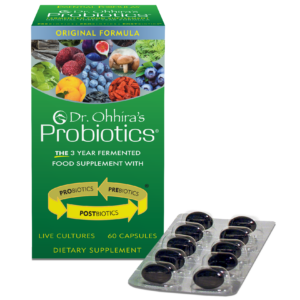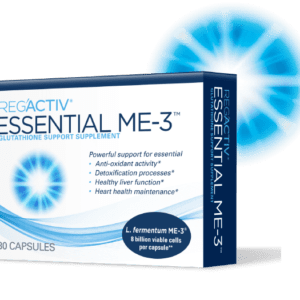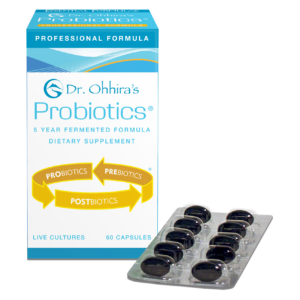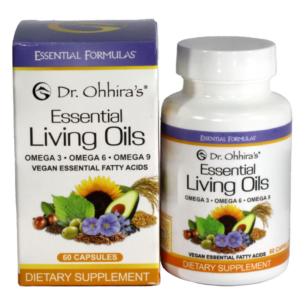Great hair and skin are often associated with overall health. That includes your gut health. Many studies conducted in the last decade indicate that the microbial balance in your gut may affect your hair and skin in various ways.
Omega-3 fatty acids can also play a role. Given how common hair loss is—50% of men aged 50 and 38% of women over 70—probiotics and omega-3 supplements can mean good news for a large part of the population.
How Gut Health Can Impact Your Hair Health
To understand how probiotics could benefit your hair, it’s important to look at how your gut impacts the rest of your body.
The environment in your gut—called the microbiome—is home to both beneficial and harmful bacteria. You need a sufficient quantity of “good” bacteria to maintain various bodily functions and keep harmful bacteria populations under control. An imbalance may lead to the following issues.
Inflammation
Your gut’s environment plays a key anti-inflammatory role by preventing foreign substances from leaking through the tissue of your gut. If the microbial barrier is too sparse, food particles may enter your bloodstream and provoke an immune response from your body. This results in inflammation, and that may lead to hair loss.
Conversely, introducing certain probiotics can help your body produce anti-inflammatory T-cells, as occurred in one study involving mice. When L. reuteri probiotic supplements were fed to mice, there was increased production of these T-cells, suggesting that these supplements could lead to more healthful aging.
-
 Dr. Ohhira’s® Probiotic Supplements with Original Formula$13.95 – $89.95
Dr. Ohhira’s® Probiotic Supplements with Original Formula$13.95 – $89.95 -
 Reg´Activ® Essential ME-3$39.95
Reg´Activ® Essential ME-3$39.95 -
 Dr. Ohhira’s® Probiotics Professional Formula$39.95 – $129.65
Dr. Ohhira’s® Probiotics Professional Formula$39.95 – $129.65
Poor Digestion
Bad digestion is another issue that could arise from poor gut health. For instance, irritable bowel syndrome (IBS) is often associated with nutrient malabsorption since it disrupts digestion. IBS is also associated with gut microbiome imbalance.
Correcting this imbalance may help relieve symptoms and improve digestion. Given that hair growth depends on various nutrients, helping your gut absorb those nutrients may promote healthier hair.
Hormonal Imbalance
Finally, hair loss often results from hormonal imbalances, including those that come with aging. In addition, disorders or trauma may result in these imbalances as well.
These imbalances can be helped with the use of probiotics, as is suggested by one study conducted on male mice, in which probiotic supplements were found to increase testosterone levels.
Probiotics for Skin and Hair
Given the connection between gut health and hair loss, it becomes evident that for some, a possible solution to thinning hair may come in the form of probiotics. Introducing the right bacteria into your gut can lead to numerous health improvements, and those may be reflected in your hair and skin. Topical probiotics may also be beneficial for skin health.
Research appears to support this. For instance, one study published in 2013 found that mice that ate probiotic yogurt had thicker, more lustrous fur and healthier skin, suggesting that probiotics could prevent hair loss in humans.
With less inflammation, better digestion, and a better hormonal balance, probiotics may lead to a healthier look from the inside out.
Omega-3s for Hair
Omega-3s can also play a role when it comes to preventing hair loss. A 2018 study showed that fermented fish oil increased hair growth in mice, while a 2015 study showed improved hair growth in women after taking omega-3 supplements. While the research is far from conclusive, it does seem to indicate that omega-3 supplements—such as Dr. Ohhira’s Essential Living Oils—could support hair growth.
Frequent Questions About Probiotic Hair Care
Some questions that often come up with probiotics, omega-3s, and hair loss include the following.
Can probiotics cause hair loss?
Most research seems to suggest the opposite, actually—probiotics support internal mechanisms that may prevent hair growth, not cause it.
Do probiotics make hair thicker?
Some research—much of which has been done on mice—seems to suggest that.
Do probiotics help with gray hair?
Probiotics may help prevent gray hair, but research is sparse in this area.
Can stomach problems cause hair loss?
Probiotics may help prevent gray hair, but research is sparse in this area.
How long does it take for omega-3s to work for hair?
If your hair loss is related to an omega-3 deficiency, you shouldn’t expect results before the 12-week mark.
Probiotics and Supplements for Skin and Hair
To begin working on your health from the inside out, Dr. Ohhira’s Probiotic Supplements provide the key factors your gut needs to maintain a healthy gut, including prebiotic fibers to feed your friendly bacteria, proven probiotic strains to assist and support your own innate microbiome and postbiotics to nurture a healthier intestinal environment. To learn more about probiotics and their impact on your health, contact Essential Formulas today.







